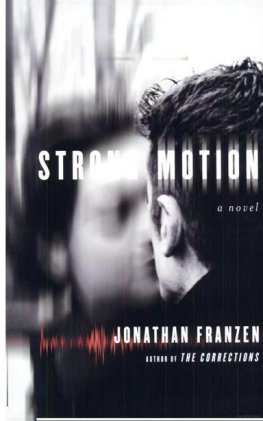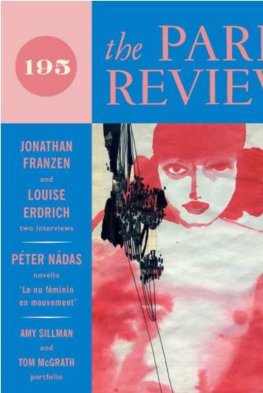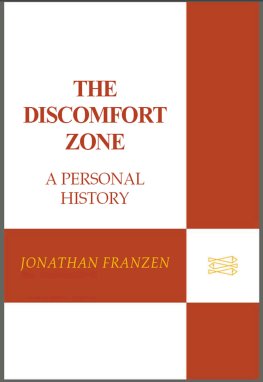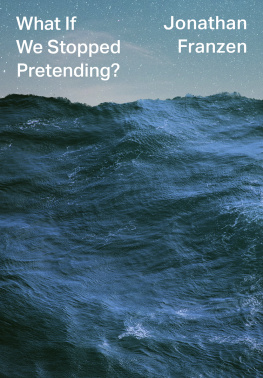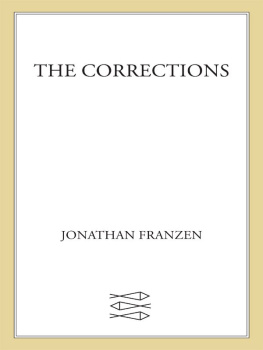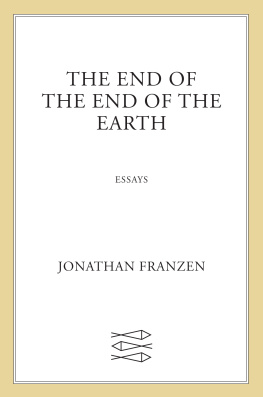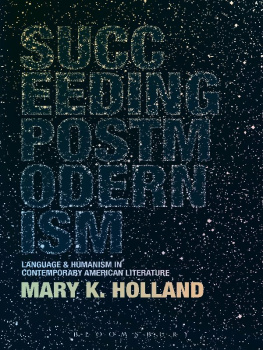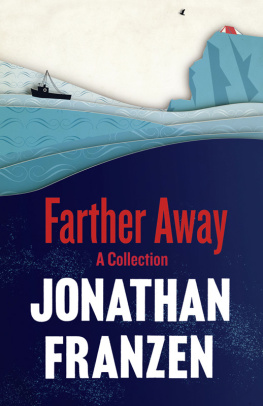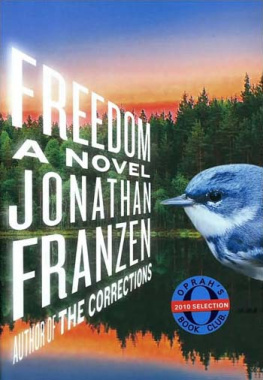Jonathan Franzen at the End of Postmodernism
Bloomsbury Literary Studies Series
Also available in the series:
Active Reading by Ben Knights and Chris Thurgar-Dawson
Becketts Books by Matthew Feldman
British Fiction in the Sixties by Sebastian Groes
Canonising Hypertext by Astrid Ensslin
Character and Satire in Postwar Fiction by Ian Gregson
Coleridge and German Philosophy by Paul Hamilton
Contemporary Fiction and Christianity by Andrew Tate
Ecstasy and Understanding edited by Adrian Grafe
English Fiction in the 1930s by Chris Hopkins
Fictions of Globalization by James Annesley
Joyce and Company by David Pierce
London Narratives by Lawrence Phillips
Masculinity in Fiction and Film by Brian Baker
The Measureless Past of Joyce, Deleuze and Derrida by Ruben Borg
Milton, Evil and Literary History by Claire Colebrook
Modernism and the Postcolonial by Peter Childs
Novels of the Contemporary Extreme edited by Alain-Phillipe Durand and Naomi Mandel
The Palimpsest by Sarah Dillon
Recalling London by Alex Murray
Romanticism, Literature and Philosophy by Simon Swift
Seeking Meaning for Goethes Faust by J. M. van der Laan
Sexuality and the Erotic in the Fiction of Joseph Conrad by Jeremy Hawthorn
Such Deliberate Disguises: The Art of Phillip Larkin by Richard Palmer
Womens Fiction 19452000 by Deborah Philips
Jonathan Franzen at the End of Postmodernism
Stephen J. Burn

Bloomsbury Academic
An imprint of Bloomsbury Publishing Plc
50 Bedford Square London WC1B 3DP UK | 1385 Broadway New York NY 10018 USA |
www.bloomsbury.com
Bloomsbury is a registered trade mark of Bloomsbury Publishing Plc
Stephen J. Burn, 2008
Stephen J. Burn has asserted his right under the Copyright, Designs and Patents Act, 1988, to be identified as Author of this work.
All rights reserved. No part of this publication may be reproduced or transmitted in any form or by any means, electronic or mechanical, including photocopying, recording, or any information storage or retrieval system, without prior permission in writing from the publishers.
No responsibility for loss caused to any individual or organization acting on or refraining from action as a result of the material in this publication can be accepted by Bloomsbury or the author.
British Library Cataloguing-in-Publication Data
A catalogue record for this book is available from the British Library.
ISBN: HB: 978-1-8470-6248-2
PB: 978-1-4411-9100-7
ePUB: 978-1-4411-9124-3
ePDF: 978-1-4411-9440-4
Library of Congress Cataloging-in-Publication Data
A catalog record for this book is available from the Library of Congress
For Julie
Acknowledgements
Farrar, Straus and Giroux, LLC and HarperCollins Publishers Ltd have kindly granted permission to reprint: Excerpts from The Corrections by Jonathan Franzen Copyright 2001 by Jonathan Franzen; Excerpts from The Twenty-Seventh City by Jonathan Franzen. Copyright 1988 by Jonathan Franzen; Excerpts from Strong Motion by Jonathan Franzen. Copyright 1992 by Jonathan Franzen; Excerpts from How to be alone by Jonathan Franzen. Copyright 2002, 2003 by Jonathan Franzen; Excerpts from The Discomfort Zone by Jonathan Franzen. Copyright 2006 by Jonathan Franzen.
Preface
Jonathan Franzen occupies a revealing position amongst Americas millennial novelists. While critics at centurys end began to anatomize the end of postmodernism, mapping postmodernisms wake (Harris), or announcing the emergence of post-postmodernism (McLaughlin), the conflict between postmodern innovation and more conventional narrative forms was internalized and played out in Franzens novels and essays. His work has tried to absorb the story-based narrative energies of writers such as Isaac Bashevis Singer and Alice Munro, while it has been simultaneously shaped and distorted by the achievements of American postmodernism.
Given the recent interest in new directions after postmodernism signaled by critics such as Charles B. Harris and Robert L. McLaughlin, Franzens attempt to fuse disparate traditions would seem to make a study of his work particularly timely, but for a variety of reasons his reputation has developed somewhat unevenly. His novels have often received distractingly overblown praise from reviewers eager to find and praise a major talent,
Some of the reasons why scholars have overlooked Franzens novels arent difficult to locate. On a basic level, Franzens hostility toward the academy may have discouraged critics from exploring his relationship to academic constructions of postmodernism. This is particularly unfortunate, however, because even Franzens hostility toward the academy seems to be entwined with postmodern fiction and the arguments that surrounded its emergence. Although Franzen confessed that he began writing novels with the belief that the highest compliment Art could be paid was to be taught in a university (A 245), by the mid-1990s he had reconceived of academia as a nursing home for terminally ill arts, and claimed it would be better the novel die with honor in the gutter than enter those gates (Ill Be Doing More of Same 34). Yet, in framing his rejection of the academy in these terms, Franzen is basically paraphrasing Gore Vidal who 20 years earlier complained that after reading works by John Barth, Donald Barthelme, and Thomas Pynchon, he would prefer for [novels] to die rather than to become teaching-tools, artifacts stinking of formaldehyde in a classroom (39).
More materially, however, the distracting details of Franzens dispute with Oprah Winfrey seem to have exerted an almost magnetic attraction for writers interested in Franzen, and what little critical attention he has received has tended to circle morbidly around the implications of this dispute: is Franzen racist? Elitist? Sexist? Instead of recycling these questions, my critical method concentrates on the novels, rather than the novelist, so this study has little to add to the host of increasingly fine-grained dissections of what is, after all, an argument over whether or not someone wanted to appear on a late afternoon TV showa subject that ought to be less intriguing than the novels themselves. Nevertheless, because Franzen draws on his own life in his novels, and so frequently appeals to his own experience in his nonfiction, I have included a biographical overview in this study. At the very least, this sketch might serve to fill out the two-dimensional cartoon figure of Franzen who sometimes functions in accounts of the Oprah affair.
In the rest of this study, however, my interest is in larger formal and rhetorical questions: what tensions emerge from the intersection of form and content in a given work? What opaque language games are hidden in Franzens ostensibly transparent prose? How does Franzen employ intertextual allusion to enrich the texture of his fiction? Unifying each of these investigationsand compromising the heart of the bookis an attempt to map the shifting coordinates of Franzens engagement with postmodern aesthetics across the arc of his early career. This is a subject that divides Franzens readers. In the wake of his first two novels, critics saw few problems in placing him directly in a line extending from the experimental heart of postmodernism. In 1996, for example, Melvin Jules Bukiet classified Franzen with Powers and Pynchon as exponents of what he called Crackpot Realism, a form of fiction that registers the deep technological changes of our times while also elevating the role of coincidence and interconnection beyond the level we ordinarily find in conventional novels. But by the time
Next page

